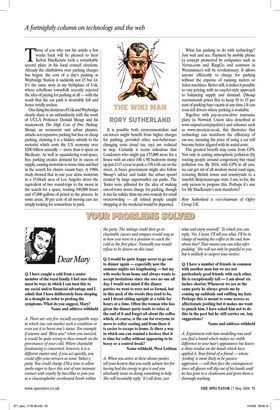THE WIKI MAN
RORY SUTHERLAND
Those of you who saw his article a few weeks back will be pleased to hear Kelvin MacKenzie took a remarkable second place in his local council elections. Already the climbdown over parking charges has begun: the cost of a day’s parking at Weybridge Station is suddenly not £5 but £4. It’s the same story in my birthplace of Usk, where rebellious townsfolk recently rejected the idea of paying for parking at all — with the result that the car park is invariably full and hence totally useless.
One thing the denizens of Usk and Weybridge clearly share is an unfamiliarity with the work of UCLA Professor Donald Shoup and his masterwork The High Cost of Free Parking. Shoup, an economist and urban planner, attacks not expensive parking but free or cheap parking, claiming it is a hidden subsidy to the motorist which costs the US economy over $200 billion annually — more than is spent on Medicare. As well as squandering road-space, free parking creates demand far in excess of supply, causing motorists to waste time and fuel in the search for elusive vacant bays. A 1980s study showed that in one year alone motorists in a 15-block area of Los Angeles drove the equivalent of two round-trips to the moon in the search for a space, wasting 100,000 hours and 47,000 gallons of petrol in the process. In some areas, 30 per cent of all moving cars are simply looking for somewhere to park. It is possible both environmentalists and car-lovers might benefit from higher charges for parking, provided other non-behaviourchanging costs (road tax, say) are reduced in step. Certainly it seems ridiculous that Londoners who might pay £75,000 more for a house with an extra 10ft x 9ft bedroom stump up just £115 a year to park a 15ft x 6ft car on the street. A brave government might also follow Shoup’s advice and tackle the urban sprawl created by large supermarket car parks. The Tories were pilloried for the idea of making out-of-town stores charge for parking, though it was far milder than my own remedy for retail overcrowding — all retired people caught shopping at the weekend would be deported. What has parking to do with technology? Just wait and see. Payment by mobile phone (a concept pioneered by companies such as Verrus.com and RingGo and common in Westminster) will be revolutionary. It allows anyone efficiently to charge for parking without the expense of running meters or ticket machines. Better still, it makes it possible to vary pricing, with an easyJet-style approach to balancing supply and demand. (Shoup recommends prices flex to keep 10 to 15 per cent of parking bays vacant at any time.) It can even tell drivers where parking is available.
Together with pay-as-you-drive insurance plans (a Norwich Union idea described at www.snipurl.com/paydrive) and schemes such as www.streetcar.co.uk, this illustrates that technology can transform the efficiency of car-use, meaning the price of using a car will become better aligned with its social costs.
The greatest benefit may come from GPS. Not only in cutting atmospheric pollution (by routing people around congestion) but visual pollution too. By 2018, with GPS in all cars, we can get rid of all modern metal road signs, restoring British towns and countryside to a tasteful, Betjemanesque state. I am, so far, the only person to propose this. Perhaps it’s one for Mr MacKenzie’s next manifesto?










































































 Previous page
Previous page